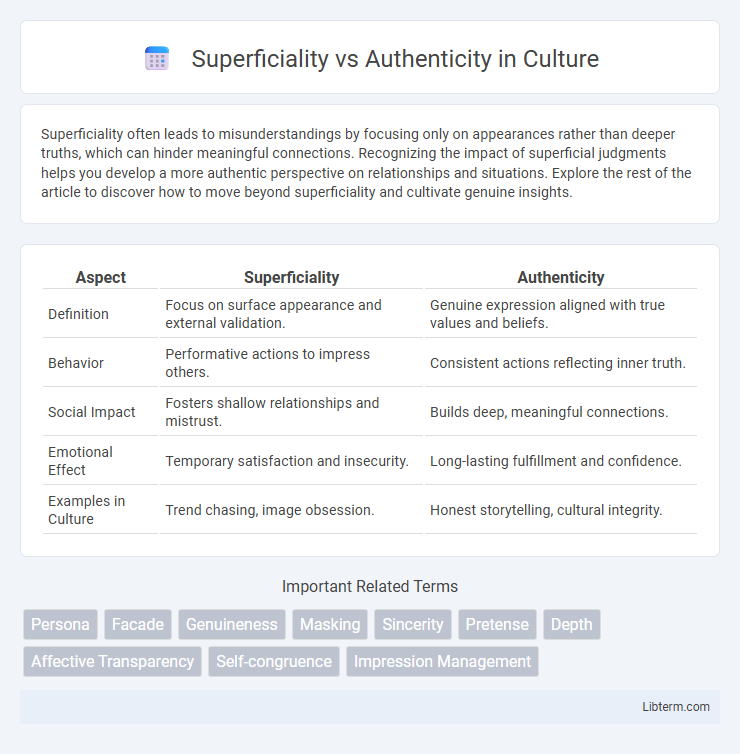Superficiality often leads to misunderstandings by focusing only on appearances rather than deeper truths, which can hinder meaningful connections. Recognizing the impact of superficial judgments helps you develop a more authentic perspective on relationships and situations. Explore the rest of the article to discover how to move beyond superficiality and cultivate genuine insights.
Table of Comparison
| Aspect | Superficiality | Authenticity |
|---|---|---|
| Definition | Focus on surface appearance and external validation. | Genuine expression aligned with true values and beliefs. |
| Behavior | Performative actions to impress others. | Consistent actions reflecting inner truth. |
| Social Impact | Fosters shallow relationships and mistrust. | Builds deep, meaningful connections. |
| Emotional Effect | Temporary satisfaction and insecurity. | Long-lasting fulfillment and confidence. |
| Examples in Culture | Trend chasing, image obsession. | Honest storytelling, cultural integrity. |
Understanding Superficiality: Definition and Characteristics
Superficiality refers to a focus on outward appearances or surface-level attributes, often neglecting deeper meanings or genuine emotions. Characteristics include valuing image over substance, prioritizing popularity or materialism, and demonstrating shallow interactions lacking emotional depth. This mindset can lead to misunderstandings and weakened relationships due to a lack of authentic connection and empathy.
The Essence of Authenticity: What Does It Mean?
Authenticity means embracing one's true self without pretense or superficial masks, reflecting inner values and genuine emotions. It involves consistent alignment between beliefs, actions, and expressions, fostering trust and meaningful connections. Unlike superficiality, which prioritizes external appearance and social approval, authenticity roots identity in sincere self-awareness and integrity.
Social Media’s Role in Fostering Superficiality
Social media platforms often prioritize curated images and highlight reels that encourage superficial engagement and self-presentation over genuine interactions. Algorithms amplify visually appealing content, promoting validation through likes and followers rather than authentic connection or meaningful dialogue. This digital environment fosters a culture where appearance can overshadow substance, leading users to value external approval over true self-expression.
Cultural Influences on Superficial and Authentic Behaviors
Cultural norms and values significantly shape the expression of superficial and authentic behaviors, influencing how individuals prioritize appearance, social status, and emotional transparency. Collectivist societies often emphasize harmonious relationships and external conformity, which can encourage surface-level interactions, while individualistic cultures tend to value self-expression and genuine emotions, fostering authenticity. Media representation and socialization processes further reinforce cultural standards, impacting how people navigate the balance between superficiality and authenticity in social contexts.
Psychological Impacts of Superficial Interactions
Superficial interactions often lead to increased feelings of loneliness and decreased emotional well-being due to the lack of meaningful connection and vulnerability. These shallow exchanges can trigger stress responses and negatively affect mental health by undermining the development of trust and empathy in relationships. Long-term reliance on superficial communication may result in lower self-esteem and heightened anxiety as individuals struggle to find genuine social support.
Recognizing Signs of Genuine Authenticity
Genuine authenticity is recognized through consistent behavior, transparent communication, and alignment between words and actions, indicating true intentions. Signs include vulnerability in sharing personal experiences, deep emotional connections, and an absence of pretense or manipulation. Observing these markers helps distinguish authentic individuals from superficial interactions driven by image or social expectations.
The Dangers of Superficial Relationships
Superficial relationships, characterized by shallow interactions and lack of emotional depth, often lead to feelings of loneliness, mistrust, and dissatisfaction. These connections fail to provide genuine support or meaningful understanding, increasing the risk of mental health issues such as anxiety and depression. Prioritizing authenticity fosters stronger bonds, emotional resilience, and long-term well-being.
Building Authentic Connections in a Superficial World
Building authentic connections requires genuine empathy, active listening, and vulnerability that transcend superficial interactions often dominated by social media and surface-level communication. Prioritizing meaningful conversations and shared values fosters trust and deep understanding, countering the pervasive influence of performative behaviors and shallow relationships. Authenticity strengthens emotional bonds, creating lasting connections rooted in honesty and mutual respect rather than fleeting impressions.
Strategies for Cultivating Personal Authenticity
Cultivating personal authenticity involves prioritizing self-awareness through regular reflection and mindfulness practices, enabling individuals to align actions with core values. Setting clear boundaries safeguards genuine self-expression against external pressures and social expectations. Embracing vulnerability fosters deeper connections and promotes emotional honesty in both personal and professional relationships.
The Benefits of Choosing Authenticity over Superficiality
Choosing authenticity over superficiality fosters deeper connections and builds lasting trust, essential for meaningful relationships and professional success. Authenticity enhances emotional well-being by promoting self-awareness and genuine self-expression, reducing stress and increasing overall happiness. Embracing authenticity encourages personal growth and resilience, enabling individuals to navigate challenges with integrity and confidence.
Superficiality Infographic

 libterm.com
libterm.com